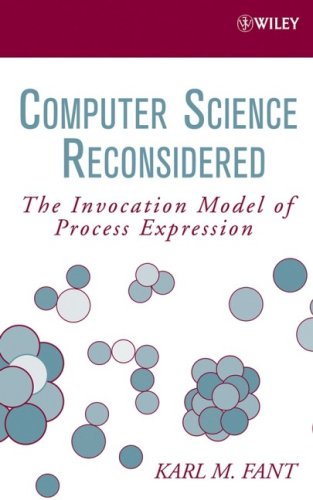Product desciption
Computer Science Reconsidered The Invocation Model Of Process Expression Karl M Fant by Karl M. Fant 9780471798149, 0471798142 instant download after payment.
I've known the author of "Computer Science Reconsidered" for almost thirty years, so while I'll try to be objective, expect some personal bias as well as some disagreements with Karl. Traditional computer science places the sequential algorithm and Boolean logic at the heart of computer science. Karl takes a much wider view. He sees computer science as the theory of "process expression" - for instance, given the process of adding a million numbers, how is this process physically accomplished(physically expressed) and symbolically represented(symbolically expressed)? In general, this will be done most efficiently concurrently, and not necessarily by specifying an algorithm, but perhaps by using some clockless physical system that is smart enough to 'resolve' the problem in some partially specified, automatic manner. Karl's book takes clockless concurrent process to be fundamental(as it is in nature). He describes very primitive processes in a new and idiosyncratic language that may be off-putting to some readers, but in truly concurrent processes, notions like 'state' and 'register' are far too narrow and completely inappropriate, so much traditional process language must be abandoned. It seems obvious to me that Karl is on the right track - his approach seems radical until one starts to be embarrased at the primitive, unnatural state of today's computer science, where timing circuits must still be designed (yet nature doesn't do this), and all process details must still be specified (nature doesn't do this). Besides, the foundation of today's c.s. is about Turing Machines and the question, "Is a given process possible," when pragmatically c.s almost always instead asks, "How is a given process best done?" Every revolution takes place in a context. I have found that Karl's ideas intersect in bits and pieces with Carver Mead's ideas on making computers more like Fruit Fly brains (low power - millions of times more efficient than those clunky silicon things), and Judea Pearl's causality flow diagrams (where, as in Boolean Logic, equations by themselves are incomplete symbolic process expressions), the Relational Quantum Mechanics of Carlo Rovelli (where there are no objective, universal system states), and my recent work on human psycology and religion, where moral rule following (like an algorithm) is treated as an immature, autistic form of ethical behavior, compared to the spontaneous ethical behavior of famous religious figures. Karl's book is a new foundation. Don't expect to read a handbook with complete hardware and software languages spelled out. Those are being worked on, or in his previous book. Read Karl's new book like you're reading a mix of Copernicus and Tesla - lots of wild new ideas, ocassionally stunning insights and many sparks!


